
Federal judges make critical legal decisions about religious freedom and our other constitutional rights. First Liberty continues to monitor judicial nominees and to provide you with the facts about the ones with a radical or unacceptable record.
Here’s a quick roundup on judicial nominations and what’s happening across the federal courts.
Senate Delays Vote on Controversial Judicial Nominee
This week, the U.S. Senate pulled a planned vote on Mustafa Kasubhai’s nomination to be a district court judge in Oregon.
Republicans had lined up in opposition to Kasubhai’s nomination, and Democratic absences essentially forced Majority Leader Chuck Schumer to pull the vote, The Hill reports.
First Liberty previously explained that Kasubhai’s record is filled with views and legal theories far outside the mainstream.
“This is someone with a history of early Marxist statements, such as discussing the need for a ‘creative struggle toward redefining property’ in a law school writing, and who more recently gave a speech entitled ‘Reflections on Equity and Privilege,’” explains judicial analyst Carrie Severino.
“On the bench, he has shown leniency in cases involving violent crimes against children,” adds Severino. “In a decision unanimously reversed by the Oregon Court of Appeals while he was serving as a state judge, he would not terminate the parental rights of a father with a history of domestic violence and drug dependency who had been recently released from prison.”
Kasubhai’s record even shows how radical gender ideology seeped into his courtroom rules as a magistrate judge. He advocates using “preferred pronouns” in court proceedings, official opinions and emails.
In a 2021 essay titled “Pronouns and Privilege,” Kasubhai described his courtroom practice of encouraging attorneys, defendants, witnesses, and jurors to state their pronouns during legal proceedings. He also touted disclosure of his own pronouns (he/him) in the signature line of emails and legal opinions.
His hope, it appears, is that higher courts will one day embrace this same practice.
“Imagine how powerful a statement it could be when Ninth Circuit Court judges do this,” Kasubhai wrote. “And dare I dare to imagine when U.S. Supreme Court justices include their pronouns?”
Sen. Cruz of Texas pressed Kasubhai on this issue at his confirmation hearing last fall, stating the nominee’s views on human sexuality were radical. “Many Biden nominees have been extreme, but your record is so far out of the mainstream that you have attracted virtually all of the questions,” Cruz said.
Mustafa Taher Kasubhai, Biden’s nominee to be the District Judge for Oregon, has a long record of radical and unhinged legal theories.
In the Wisconsin Women’s Law Journal, he penned radical screeds about sexuality and gender politics. His views are so appalling, Kasubhai isn’t… pic.twitter.com/YHrlnML0J3
— Senator Ted Cruz (@SenTedCruz) October 5, 2023
The DEI agenda is often very harmful to people of faith in the workplace, as First Liberty experts explain. It promises to increase diversity, equity and inclusion in all spaces. But it actually results in religious Americans being “canceled” at work. It’s the faithful who shoulder the consequences when corporations discriminate against them.
Kasubhai expressed support for DEI in a presentation to the Oregon State Bar, saying that it “is the heart and soul of the court system.”
Majority Leader Schumer is expected to try to get Kasubhai’s nomination across the finish line when his party is in full attendance.
Learn More:
The Hill: Schumer forced to pull vote on judicial nominee
Bloomberg Law: Senate Democrats Pull Vote on Trial Court Nominee Kasubhai
Washington Examiner: Schumer cancels vote on controversial Biden judicial nominee
Washington Free Beacon: Biden Judicial Nominee Dreams of a Day Supreme Court Justices Disclose Pronouns in Court